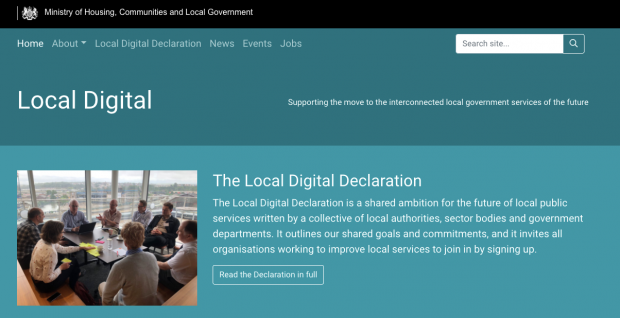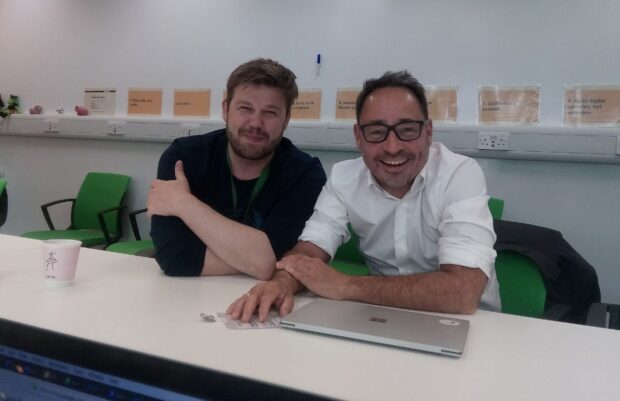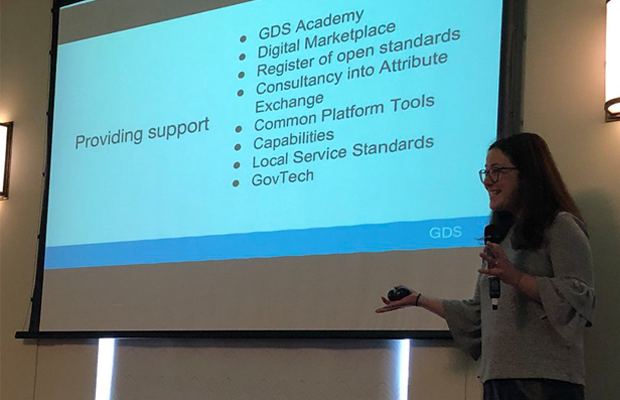
The UK’s local authorities are crucial providers of public services. From keeping the streets clean or dealing with planning applications, to providing support for isolated or vulnerable people. Local authorities are often the front line of public service provision, helping people do the things they need to do.
The Government Digital Service (GDS) has shown how the application of digital culture, practice and technologies to central government can make government work better for users. This has often involved close collaboration with local authorities who share many of the same organisational and delivery challenges.
That’s why GDS is proud to be a co-publisher of the Local Digital Declaration, which launches today. This is a set of guiding principles that will help support local authorities of all sizes or capabilities to deliver digital services and platforms that meet the needs of citizens.
The 5 principles
The Local Digital Declaration is a joint initiative from GDS and the Ministry of Housing, Communities and Local Government (MHCLG). There are more than 30 co-publishers ranging from local authority influencers to central departments. In particular, GDS has worked closely with Crown Commercial Service.
The declaration talks about what good digital transformation looks like and contains 5 principles that describe what organisations can do to achieve this.
The principles are:
- we will go further to redesign our services around the needs of the people using them - this means continuing to prioritise citizen and user needs above professional, organisational and technological silos
- we will ‘fix our plumbing’ to break our dependence on inflexible and expensive technology that doesn’t join up effectively - this means insisting on modular building blocks for the IT we rely on and open standards to give a common structure to the data we create
- we will design safe, secure and useful ways of sharing information to build trust among our partners and citizens, to better support the most vulnerable members of our communities and to target our resources more effectively
- we will demonstrate digital leadership, creating the conditions for genuine organisational transformation to happen and challenge all those we work with to embrace this declaration
- we will embed an open culture that values, incentivises and expects digital ways of working from every member of our workforce. This means working in the open wherever we can, sharing our plans and experience, working collaboratively with other organisations, and reusing good practice
Over the summer we'll be taking the declaration around the country in roadshows and in the autumn all local authorities will have the opportunity to sign up.
How the declaration came about

The Local Digital Declaration has been written in partnership between central and local government and stems from research carried out at GDS.
Last year the GDS National, International and Research team ran a discovery project in the regions outside of London. This looked into what public services around the country wanted and needed in terms of digital support.
While some local authorities are leading the way with forward-thinking digital transformation programmes, others are more isolated and have had less access trusted guidance and support to match their digital ambitions.
So, working in partnership with MHCLG, we started to develop the Local Digital Declaration. A number of workshops took place all over the UK over six months and several drafts of the declaration were circulated, commented on and then revised.
The result is a co-authored, co-published document which we hope many local authorities will sign up to with confidence, knowing it has been developed within their community.
What GDS will offer local authorities

Over this summer, the Local Digital website will be developing to include case studies, best practice, templates and other practical tools for local authorities to access. GDS will complement this by providing practical examples, content and links which will provide centralised access for local authorities to GDS tools and services.
In particular we will:
- make our messaging and payment platforms - GOV.UK Notify and GOV.UK Pay - available for local authorities to use
- raise awareness and offer training in best practice procurement and showcase the Digital Marketplace
- consult on and rework the Digital Service Standard to be applicable to local authorities
- make access to Open Standards easier and create a register of Open Standards
- link GDS Academy training opportunities to principles of the Local Digital Declaration
- consult local authorities in the creation of attribute exchange standards
Support for local authorities when and where they need it
We have also recruited two new regional relationship managers, one based in Leeds and one in Bristol. They'll be building relationships in their regions and provide a route to GDS support based on public service sector needs.
They'll also listen to wants and needs and then link local authorities to the relevant teams in London, or send the teams out where needed.
In the same way that GDS is here to support central government departments in their digital transformation, we want to be here for local authorities too. We want to offer them the support and guidance they need so that, working together, we can make things better for users.
Read the Local Digital Declaration in full and sign up to help improve local services. If you would like to know more about the regional relationship managers please email us.
You can also find out when the next roadshow event is and register to attend.
Subscribe for updates when new blog posts are published.


3 comments
Comment by Matthew Wallbridge posted on
Who is the relationship manager for London boroughs?
Matthew Wallbridge
CIO
Croydon Council
Comment by Richard Kingston posted on
Regarding the regional relationship managers, how do we go about getting in touch please?
Comment by Helen posted on
Hi Richard,
Where are you based? We'll put you in touch with the right relationship manager. Do provide your contact details.
Many thanks,
Helen
National Lead GDS